Introduction
Ayurveda, often called the “Science of Life,” is an ancient Indian medicine system that has been practised for over 5,000 years. Its holistic approach balances the body, mind, and spirit to promote well-being. This article will explore various Ayurvedic health tips to help you lead a healthier and more balanced life.
What is Ayurveda?
Definition and Origin
Ayurveda originates from the Sanskrit words “Ayur” (life) and “Veda” (science or knowledge). It is a comprehensive system of healing that considers the individual’s physical, mental, and spiritual health.
Principles of Ayurveda
The fundamental principle of Ayurveda is the balance of the three Doshas: Vata, Pitta, and Kapha. These Doshas are energies believed to circulate within the body and govern physiological activity. Balance among these Doshas is crucial for maintaining health.
The Three Doshas: Vata, Pitta, and Kapha
Explanation of Doshas
The biological energies that permeate the human body and mind are called doshas. They provide each living thing with a unique blueprint for happiness and health and regulate all mental and bodily functions.
Characteristics of Each Dosha
- Vata (Air and Space): Governs movement, breathing, and circulation. Characteristics include creativity, flexibility, and high energy when in balance.
- Pitta (Fire and Water): Regulates metabolism, digestion, and energy creation. She balanced Pitta, which results in solid willpower, intelligence, and a sharp mind.
- Kapha (Earth and Water): Maintains body structure and fluid balance. When balanced, Kapha brings calmness, stability, and strength.
Daily Routine (Dinacharya)
Importance of a Daily Routine
A consistent daily routine, or Dinacharya, aligns your body with nature’s rhythms, balances the Doshas, and promotes self-discipline and peace.
Morning Practices
- Wake Up Early: Rise before sunrise to start the day fresh.
- Oil Pulling: Swish sesame or coconut oil in your mouth to remove toxins.
- Tongue Scraping: Use a tongue scraper to clear toxins from the tongue.
- Abhyanga (Self-Massage): Massage your body with warm oil to nourish the skin and calm the mind.
**Evening
Evening Practices
- Wind Down Early: Aim to bed by 10 PM for optimal rest.
- Light Dinner: Consume a light and easily digestible dinner to ensure a good night’s sleep.
- Relaxing Activities: Engage in calming activities like reading or meditation before bed.
Dietary Tips
Eating According to Your Dosha
Understanding your Dosha type can help you choose foods that keep your body balanced and healthy.
- Vata: Favor warm, moist, and grounding foods. Avoid cold, dry, and raw foods.
- Pitta: Opt for cooling and hydrating foods. Steer clear of spicy, sour, and salty foods.
- Kapha: Choose light, dry, and warm foods. Limit heavy, oily, and sweet foods.
Importance of Balanced Meals
Ayurveda emphasizes the importance of balanced meals incorporating all six tastes: sweet, sour, salty, bitter, pungent, and astringent.
Seasonal Eating
Eating seasonally is crucial in Ayurveda. For example, in winter, consume warm and nourishing foods; in summer, opt for cooling and hydrating foods.
Herbs and Spices
Common Ayurvedic Herbs
- Turmeric: Anti-inflammatory and antioxidant properties.
- Ashwagandha: Reduces stress and boosts energy.
- Tulsi (Holy Basil): Enhances immunity and reduces inflammation.
Benefits of Ayurvedic Spices
- Cumin: Aids digestion and reduces bloating.
- Coriander: Balances blood sugar levels and improves digestion.
- Ginger: Anti-inflammatory and helps with nausea and digestion.
Ayurvedic Remedies for Common Ailments

Cold and Flu Remedies
- Tulsi Tea: Boosts immunity and fights infections.
- Ginger Tea: Clears congestion and soothes sore throats.
Digestive Issues Remedies
- Triphala: Aids digestion and detoxifies the body.
- Fennel Seeds: Relieve bloating and improve digestion.
Stress and Anxiety Remedies
- Ashwagandha: Calms the mind and reduces stress.
- Brahmi: Enhances mental clarity and reduces anxiety.
Yoga and Meditation

Benefits of Yoga
Yoga integrates physical, mental, and spiritual practices, promoting overall well-being.
Meditation Techniques
- Mindfulness Meditation: Focuses on being present in the moment.
- Breathing Exercises (Pranayama): Helps to calm the mind and enhance lung capacity.
Importance of Hydration
Ayurvedic View on Water Intake
Drink warm or room temperature water, as cold water can disrupt digestion.
Benefits of Herbal Teas
Herbal teas like ginger, tulsi, and peppermint can enhance digestion and overall health.
Sleep Tips (Nidra)

Importance of Quality Sleep
Good sleep is essential for repairing the body and maintaining mental health.
Ayurvedic Tips for Better Sleep
- Regular Sleep Schedule: Go to bed and wake up simultaneously every day.
- Warm Milk with Spices: Drink warm milk with nutmeg or turmeric to promote restful sleep.
Detoxification (Panchakarma)
Explanation of Panchakarma
Panchakarma is a detoxification process that removes toxins from the body and rejuvenates the system.
Benefits of Detoxification
- Improved Digestion: Removes toxins from the digestive tract.
- Enhanced Immunity: Strengthens the immune system.
- Increased Energy: Revitalizes the body and mind.
Skin Care Tips

Ayurvedic Skin Care Practices
- Natural Ingredients: Use turmeric, sandalwood, and aloe vera for skin care.
- Oil Massage: Regular oil massages nourish the skin and improve texture.
Benefits of Natural Ingredients
- Turmeric: Reduces inflammation and brightens the skin.
- Sandalwood: Soothes the skin and prevents acne.
- Aloe Vera: Hydrates and heals the skin.
Mental Health and Ayurveda

Connection Between Mind and Body
Ayurveda emphasizes the strong connection between mind and body, suggesting that mental health directly impacts physical health.
Ayurvedic Tips for Mental Well-being
- Meditation: Regular meditation can reduce stress and improve mental clarity.
- Herbal Supplements: Herbs like Brahmi and Ashwagandha can enhance mental health.
Exercise and Ayurveda
Importance of Physical Activity
Regular exercise is vital for maintaining a healthy body and mind.
Recommended Exercises for Each Dosha
- Vata: Gentle exercises like yoga and walking.
- Pitta: Moderate exercises like swimming and cycling.
- Kapha: Vigorous exercises like running and strength training are also needed.
Conclusion
Ayurveda offers a holistic approach to health and well-being, emphasizing the balance of body, mind, and spirit. By incorporating these Ayurvedic health tips into your daily routine, you can achieve better health, increased vitality, and overall harmony in your life. Start small, be consistent, and watch these ancient practices transform your well-being.
FAQs
- What is the best Ayurvedic tip for beginners?
- Establish a daily routine (Dinacharya) and incorporate mindfulness practices like meditation and yoga.
- How can I find out my Dosha?
- You can consult an Ayurvedic practitioner or take an online Dosha quiz to determine your dominant Dosha.
- Are there any side effects of Ayurvedic practices?
- Ayurvedic practices are generally safe when practised correctly and with guidance. However, it’s always best to consult a professional before starting any new health regimen.
- Can Ayurveda help with chronic diseases?
- Ayurveda can support the management of chronic diseases by promoting overall balance and health. However, for severe conditions, always consult with a healthcare provider.
- Where can I find Ayurvedic products?
- Ayurvedic products are available online and in health stores. Look for reputable brands that follow traditional practices.





